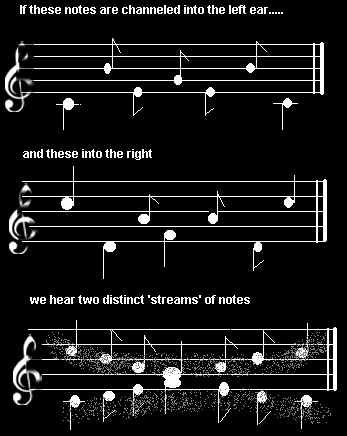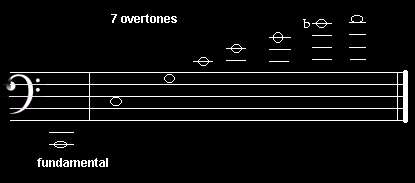 In fact,pitch and location are themselves dealt with by different areas of the brain.Our coherent sound picture of t he world is the product of many different brain systems.
In fact,pitch and location are themselves dealt with by different areas of the brain.Our coherent sound picture of t he world is the product of many different brain systems.Diana Deutsch ,Professor of Psychology at the university of California has discovered a number of aural paradoxes.For example,if two notes an octave apart are channeled into seperate headphone speakers,subjects hear the higher note in the right ear even if it is being being fed into the left.So it seems that our left and right ears-which are primarily linked,respectively,to the right and left hemispheres of the brain -'prefer' different areas of the spectrum of pitches.The left ear favours the lower notes;the right,higher ones.
Moreover,just as we tend to connect random dots by proximity (for example,seeing pictures in the patterns of the stars),we interpret pitches that are close together as a melody.Diana Deutsch has shown that if seperate synchronised sequences of high and low notes are channeled into each ear,we her these as two streams of notes grouped according to pitch.
This suggests that the location of sound may be overidden by context and the need to make coherent sequences,and that sound location and perception of pitch take place in a seperate area-or areas-of the brain from the the area that collates musical information and infers meaning from the total input.
 In fact,pitch and location are themselves dealt with by different areas of the brain.Our coherent sound picture of t he world is the product of many different brain systems.
In fact,pitch and location are themselves dealt with by different areas of the brain.Our coherent sound picture of t he world is the product of many different brain systems.
It is clear that our musical language continually plays on these systems to create its effect,and great composers constantly use musical strategies that play on our neurological systems.
Another remarkable discovery made by Diana Deutsch is that we interpret the significance of certain combinations of notes according to where we have learned our native language.
Dividing an octave into two equal parts gives an interval known as a tri-tone (so called because its two notes are three whole tones apart).This interval has a curious potency in western culture.During the medieval period the tri-tone was considered a dangerous,even diabolical interval and its use was outlawed.(This idea that tones have a moral quality is an even more ancient one.Each successive Chinese dynasty decreed its own musical scale- and a musician who introduced any 'alien' notes was liable to be put to death.)
Diana Deutsch has discovered that if pairs of tri-tone notes are electronically treated to be ambivalent in pitch (by removing their overtones) --listeners tend to hear a rising or falling in different areas of the pitch spectrum depending on where they learned english.
--listeners tend to hear a rising or falling in different areas of the pitch spectrum depending on where they learned english.
This implies that we learn spoken language through a very specific division of pitch regognition between left and right ears-and therefore between left and right hemispheres of the brain.Scientists have also recently established that people with perfect pitch-the ability to recognise a specific pitch with no other external reference-have an enlarged left temporal lobe area.
But perfect pitch is a serious misnomer.
(a)Because it denies reflexive naming of notes (between equal temprament notes ) ,recognisably attuned to the comparitively arbitrary ,from a merely anthropological ,cultural point of view
(b) because perfection is less than acoustically perfect within that system
(c)Because Heisenger showed that the absolute measurement of any data is dependant on perfect perception ,not perfect ontology.
(d)Accordingly ,perfect pitch ,the concept ,is a confusion of the science of what can be known (epistemology) hijacking the science of what is ontology .
(muse0 is an exellent music notation editing program ,and even speaks abc)